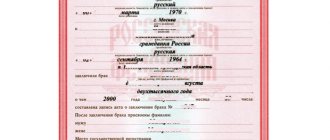The period allotted for entering into an inheritance is six months after the death of the testator. If during this time a citizen does not have time to contact a notary, he is automatically excluded from the list of applicants for the property of a deceased relative. The reasons why a successor does not enter into an inheritance can be different, from ignorance of the death of the testator to reluctance to receive his property. Below we will talk about what happens if the heirs do not enter into the inheritance and do not refuse it.
On inheritance by will after the death of the testator
A will is a document in which the testator disposes of property after death. According to this document, the inheritance can go to any person, not even relatives. If, when transferring property by law, equal shares are provided for all successors, then in the will they can be distributed at your own discretion. The document can also indicate special conditions under which inheritance will become possible. For example, successors must care for the deceased’s pet, are obliged to help his elderly parents, etc. The procedure for accepting an inheritance and its features are regulated by Ch. 62 of the Civil Code of the Russian Federation, the Constitution of the Russian Federation, Federal Law No. 147.
Dear visitors! To receive detailed and free consultation from our lawyers, leave your request in the online consultation form. We will help resolve your issue as quickly as possible!
Along with the property, the obligations of the testator also pass:
- payment of debts (for example, for housing and communal services);
- repayment of a loan, mortgage;
- fulfillment of special conditions, if this is prescribed in the spiritual order.
Inheritance by will is possible if:
- presence of an administrative document;
- absence of reasons for recognizing the successor as unworthy;
- compliance with the deadlines provided for by the legislation of the Russian Federation.
Expert opinion
Svetlana Samoilenko
Inheritance lawyer
Ask me a question
Confirmation of consent to receive property and obligations associated with it is the writing of an application for its acceptance and issuance of the appropriate certificate.
If you write a will, who has the right to inherit?
If there is a will, who has the right to inheritance in Russia? The transfer of property rights can be carried out to the following legal successors:
- FL;
- Legal entities;
- States;
- Municipal and international entities;
- Non-profit organizations.
That is, the testator can write a will in which he will transfer his property not only to close relatives, but also to third parties and even legal organizations. This rule is related to the need to ensure complete freedom of expression. However, this freedom should not contradict the interests of other persons.
Searching for a will through a notary
To enter into inheritance, you must present a will. However, it is not always in the hands of successors. First of all, you need to look for it in the documents of the deceased; if this is not possible or the spiritual directive is not found, you can turn to any notary for help.
He must provide:
- death certificate (if you don’t have one, a duplicate can be obtained from the registry office at the place where the death was stated);
- your passport;
- papers confirming family ties.
The notary will look at the information in his database and tell you the coordinates of the authorized person. If the potential successor is not a relative, then obtaining data will be problematic. You can view the information yourself through the website of the Federal Notary Chamber: https://notariat.ru/ru-ru/help/probate-cases/. On the page that opens, you need to fill in the fields with your full name, date of birth and death of the testator and click on “Search case.” After this, the address and telephone number of the notary conducting the paperwork will open.
After receiving the executive data, you need to contact him. The second copy of the will is kept by him, he will be able to issue a duplicate of it.
There should be a note on the spiritual order that it has not been changed or cancelled. If adjustments have been made, duplicates of all wills are issued, and the current one is marked accordingly. Such marks must also be placed on the copies of the heirs who have them in their hands. Otherwise, the documents will not be considered valid.
Cancellation and modification of a will
There is usually a certain period of time between the day the document is certified and the moment it comes into force. The Civil Code of the Russian Federation allows that, if the testator wishes, the text of the will can be changed upon his submission in whole or in part (Article 1130 of the Civil Code of the Russian Federation). It is also possible to completely cancel the document with the subsequent drawing up of a new one after a certain period or without it. In the latter case, the legal successors inherit.
A will can be changed as many times as desired . Amendments are made only at the will of the testator . The consent of any person, even those indicated in the document, is not required and is not taken into account during subsequent challenges (clause 1 of Article 1130 of the Civil Code of the Russian Federation).
Each subsequent will cancels or changes the clauses set out in the new edition. Even if there are no clear instructions about cancellation or adjustment, but the new text contradicts the old one, the change is counted. If the last will is recognized as void or invalid , the previous version of the document will have legal force (clause 3 of Article 1130 of the Civil Code of the Russian Federation).
In accordance with paragraph 4 of Art. 1130 of the Civil Code of the Russian Federation, a will can be canceled by a special order of the testator . The signature on it is also certified by a notary.
A will written in an emergency situation (Article 1129 of the Civil Code of the Russian Federation) can correct an earlier document drawn up under exactly the same conditions .
Example M. made a will in which he appointed his son as heir to an apartment and a suburban house. A year and a half later, he certified a new document from a notary, according to which the country house was to go to his daughter. The second will changed the conditions of the first only as regards the inheritance of the country house. Thus, according to these two documents, after M.’s death, the apartment will go to the son, and the suburban house to the daughter.
Step-by-step instructions for entering into an inheritance under a will
How to enter into an inheritance under a will step by step:
- Contact the responsible notary.
- To write an application. Based on this, the authorized person opens the office work, assigns it a number and enters it into the Unified National Identification Number.
- Provide documentation (the full list is provided by the notary when writing the application). After this, the authorized person checks the papers, finds out if there are other heirs (if so, contacts them if they have contact information or submits an advertisement to the media for search).
- Pay the state fee (the amount and details are reported by the notary).
- Receive a certificate of inheritance. The authorized person in charge of the case will tell you when to come for him.
After receiving the documents from the notary, you can contact the responsible structures to re-register the property as your own.
Documentation can be brought to the notary in person, sent by mail (after having certified signatures and copies of papers), transferred through a third party with a general power of attorney (the only exception is the representation of the interests of minors, incompetent, partially capable, if documents are transferred for them by parents or guardians).
Application for acceptance of inheritance. Sample application
The application contains the following information:
- FULL NAME. notary (where the paper is submitted);
- Full name, address of the heir (and his representative when documents are transferred through a third party);
- FULL NAME. testator, his last registered address, date of death;
- grounds for receiving an inheritance (reference to a will);
- composition and brief description of the inherited property (for example, the location of the property, its footage, etc. or the make, color of the car, etc.);
- FULL NAME. and contact details of the remaining successors (including those with a mandatory share) and legatees, the property due to them or part of it;
- Date of filing and signature (handwritten or by an official representative).
Sample application for acceptance of inheritance:
Also, an application for accepting an inheritance and obtaining a certificate can be written on one form:
Documentation
To enter into inheritance rights you must provide:
- passport (birth certificate, if the successor is under 14 years of age);
- identification document and notarized power of attorney (when documents are submitted through a representative);
- death certificate;
- will;
- certificate of the deceased’s last registration;
- cadastral plan (if the property is a plot of land or a house);
- technical passport (when inheriting an apartment or house);
- PTS and vehicle registration certificate (if inheriting a car);
- deposit agreement and savings book (when inheriting shares and deposits);
- an extract from the house registration register (in case of inheritance of real estate);
- papers confirming ownership;
- a deed with the estimated value of property on the date of death of the testator.
If technical documents for real estate are not available, they can be obtained from the BTI. They are done quite quickly, a week at most.
If necessary, the notary may request other documentation. The legislation of the Russian Federation does not prohibit this.
State duty
The amount of the duty depends on the value of movable and real estate, the degree of family relationship with the deceased:
- 0.3% for parents, children, spouses, brothers/sisters;
- 0.6% for others.
Expert opinion
Svetlana Samoilenko
Inheritance lawyer
Ask me a question
The price of real estate is determined by cadastral value, and the rest by market or inventory value. You can obtain an appraisal document for a plot, house or apartment from Rosreestr (the certificate will cost 200 rubles). It is also possible to order the certificate from a specialized company. The cost of services depends on the region and the object of assessment. On average it varies between 1500-5000 rubles. These documents and a receipt for payment of the state duty must be provided to the notary.
There are categories of citizens who are exempt from paying state taxes:
- successors who lived in the same territory as the testator (when living space is inherited);
- minors;
- relatives of those killed in the line of duty or performing civic duty;
- WWII veterans;
- relatives of victims of political repression;
- full holders of the Order of Glory, Heroes of Russia and the USSR;
- families of liquidators of the accident at the Chernobyl nuclear power plant of categories 1 and 2 or groups 3 and 4 (if they live and work in the exclusion zone).
A benefit of 50% is given to disabled people of groups I and II and childhood.
What will the spouses receive?
There is another basis for partially challenging the order - the inclusion in it of property that does not belong to the testator. According to the law, a person can only dispose of the property that he officially owns. For example, the document may include all property of the spouses. Inheritance relations between spouses are regulated by the norms of the civil and family code and, by law, before the distribution of the inheritance, the spousal share in the amount of 50% must be allocated. If this was not done, the spouses can sue.
Established deadlines for entering into inheritance
To enter into an inheritance, 6 months are given from the date following the day of death. After the specified period, the notary issues a certificate. However, papers may be received earlier. For example, when all the heirs have assumed rights or renounced them.
The deadlines increase if the rights are transferred to the successors appointed in the will:
- for 3 months if the direct heirs do not apply in a timely manner;
- for six months, when the right was transferred when a refusal was written by the direct successor or as a result of being declared unworthy;
- before the birth of the heir (if he is still in the womb) + another 6 months so that the mother has time to submit all the documents for her child.
The deadlines are regulated by Art. 1154 of the Civil Code of the Russian Federation.
Restoring the deadline
If deadlines have been missed, they can be restored if there are compelling reasons for the delay. For example:
- staying abroad with the impossibility of entering the country;
- treatment in a closed medical institution;
- ignorance and impossibility of knowing about the death of the testator (for example, lack of contact, deliberate concealment, etc.).
The court must provide evidence that the reasons for the missed deadline are compelling.
There is another way to restore them if there are other heirs present. They must give their written consent to this, certified by a notary.
How to formalize a waiver of inheritance in favor of another person
To renounce an inheritance in favor of another person, it is necessary to submit an appropriate application outlining your personal will. A citizen has the right to transfer his part of the inheritance to any other person, regardless of status. The decision must be justified - all arguments are presented in documentary form. You cannot assign your share to an applicant who has been found unworthy.
The application is submitted to the office of the notary who is handling the specific case. An employee of this service will check the application for the presence of all grounds and issue appropriate confirmation. The decision to transfer the inheritance share to a third party may be challenged by other applicants.
Mandatory share of inheritance in the presence of a will
When writing a spiritual disposition, the will of the testator is somewhat limited. Even if he wishes, he will not be able to disinherit persons with a mandatory share:
- disabled children, parents, spouse of the testator;
- dependents who were in the care of the deceased for at least a year before death.
They are entitled to half of the inheritance that would have been received upon transfer of property under the law. Typically, movable and real estate passes to them from the intestate portion. If it is not enough, then the shares of other successors are cut.
Mandatory share size
The obligatory share in the inheritance in a will is 50% of what the person would have received if the inheritance had been passed on legally. For example, the inheritance mass includes 100,000 rubles. There are two legal heirs, a will has been drawn up. One of the direct legal successors is incapacitated. Legally, he would have received 50,000, taking into account the second successor. However, the person is not named in the will. According to the law, a person in such a situation can claim 25,000 rubles.
There are also more complex situations. Let's look at them using an example with the specified parameters. The applicant for the obligatory share is indicated in the document, however, according to the document, he should receive only 10,000 rubles. And in this case, a person has the right to claim an additional payment, since the size of the OD share should not be less than the assigned one. In such a situation, the heir must be paid an additional 15,000 rubles.
How is the obligatory share formed?
The formation of an OA is carried out depending on specific circumstances. If not all property is specified in the will, then the share will be created from the remaining property. If all the property was indicated in the order, the shares of legal successors under the will will be reduced to form a mandatory share.
Types of wills with conditions
Spiritual management may have features and nuances that directly affect the composition and use of the inheritance.
Testamentary refusal
Give a chance:
- live in the living space of another person (legate) for a certain period or until the end of life;
- allow temporary or lifetime use of any item from the property;
- oblige the persons specified in the will to pay the legatee funds in the specified amount and within the specified period;
- require the successors to fulfill other conditions in relation to the legatee.
A will can specify several legatees at once. If one refuses or dies before the testator, the rights will pass to the other.
Testamentary assignment
A testamentary assignment means the performance of services by heirs of a property and non-property nature. For example, caring for the deceased’s pet, his garden, home restoration, etc. Only if these conditions are met will the successors be able to become owners of the inheritance.
Is it possible to challenge a will?
Many people mistakenly believe that a will cannot be challenged. Therefore, they voluntarily refuse to protect their interests. However, any applicant who believes that his rights have been infringed may apply to the judicial authorities to challenge the will (Article 1131 of the Civil Code of the Russian Federation). Whether you can receive an inheritance depends on the circumstances. The legislation provides several grounds for challenging the will of the administrator. A document may be declared invalid if the plaintiff manages to prove that:
- the document was drawn up in violation of the law;
- the owner of material assets determined successors while under the influence of drugs or alcoholic beverages;
- the manager was incapacitated due to mental disorder;
- the document was drawn up to hide another transaction;
- the successor is unworthy.
Grammatical errors and other minor violations cannot cause the annulment of the expression of will if they do not interfere with understanding the meaning of the expression of will. The fact of a person’s incapacity can be confirmed by a medical report or a court decision.
A declaration of will may be annulled if it was drawn up instead of a lifelong maintenance agreement or another agreement. Unworthy heirs include people who neglected their duties towards the testator or put pressure on him in order to receive an inheritance.
To whom will the property be transferred if its owner did not leave a will?
There are two types of inheritance: by will and by law. The first involves the transfer of property according to the will of the deceased owner. If a person has not made a will during his lifetime, inheritance occurs according to law. At the same time, there is a sequence of inheritance of property by relatives. A total of eight inheritance queues are defined.
First priority heirs include the spouses, parents and children (or grandchildren if the children are deceased) of the testator. If there are no such heirs, the property is divided between the second-order heirs - these are the testator's sisters and brothers with whom he shares one or both parents, as well as nieces and nephews. Third-degree heirs include aunts, uncles, and cousins and brothers of the testator. The heirs of the fourth to sixth lines are more distant relatives of the deceased: great-grandparents, great-great-grandchildren and great-grandsons, great-aunts and grandfathers, great-aunts and grandsons, great-aunts and uncles, first-cousin nephews and nieces. If there are no heirs listed above, the heirs of the seventh order can claim the property of the deceased - these are the stepdaughters, stepsons, stepmother and stepfather of the testator. The state is the heir of the eighth stage. The property becomes his property if there are no other heirs.
In what cases can you do without a notary?
After drawing up a will, the notary checks its text, prints the document on a special form, and then certifies it. There are also closed wills, the contents of which the notary does not see - he only receives a sealed envelope in front of two witnesses. In some situations, when drawing up a will, you can do without notarization - if a person does not have the opportunity to contact a notary, or if special circumstances arise that pose a threat to his life. Then the will is drawn up in writing and signed by the testator in the presence of two witnesses.








